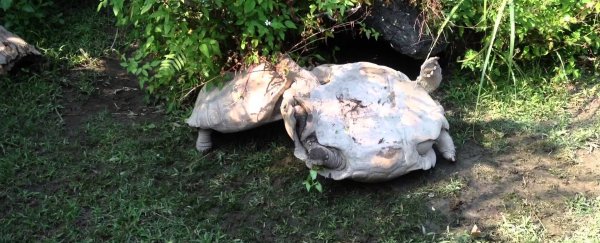In one of the slowest but most adorable rescue missions ever, this giant tortoise at Taipei Zoo in Taiwan flips its enclosure mate over after it gets stuck on its back.
Although it looks silly, getting flipped over can be pretty dangerous. According to Cambridge University science communicators, the Naked Scientists, early explorers and sailors used to actually take giant land turtles with them on long voyages as a source of fresh meat - and they'd simply keep them on their backs so they couldn't wander around the ship.
The fact that tortoises have evolved to pretty much be useless once turned over seems pretty crazy, but scientists have actually found that their shells may have evolved to be so impractical as a result of other, more important functions.
Back in 2007, a team of researchers from the Budapest University of Technology and Economics in Hungary used a mathematical model to calculate how well land-based turtles and tortoises would be able to flip themselves over based on different shell types. Essentially they were looking at how likely it is that an empty shell would land the right way up if you pushed it along the ground on its back.
The results showed that there are generally three strategies for tortoise shells - domed and lumpy, flat, and somewhere in between. The species equipped with more domed and lumpy shells pretty much automatically right themselves if they end up upside down, while those with flatter shells require a lot of effort to flip over.
As the Naked Scientists write:
The very tall domed shells of star tortoises have a natural tendency to roll back into an upright position, since they have what is known as a mono-static shape, which effectively means there is one position that they are most stable in – and that is the right way up.
So why would so many land based tortoises have such flat shells? The 2007 study found that flat shells actually have some important benefits on land, such as giving tortoises the ability to dig into the ground and also control the amount of water they lose.
And if they didn't have them, we wouldn't have this day-making video to watch. So we're pretty grateful.
Source: AuDi Yu via Digg, The Naked Scientists
